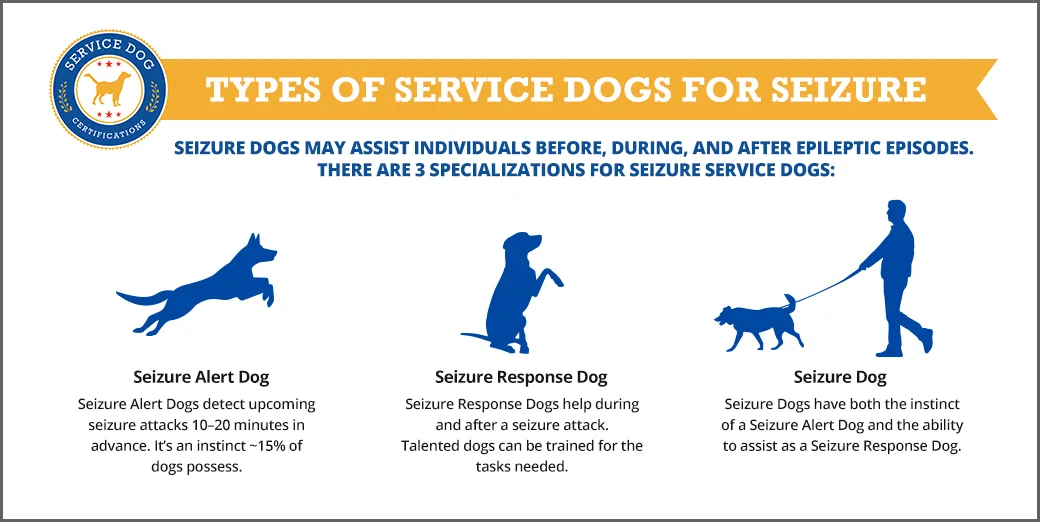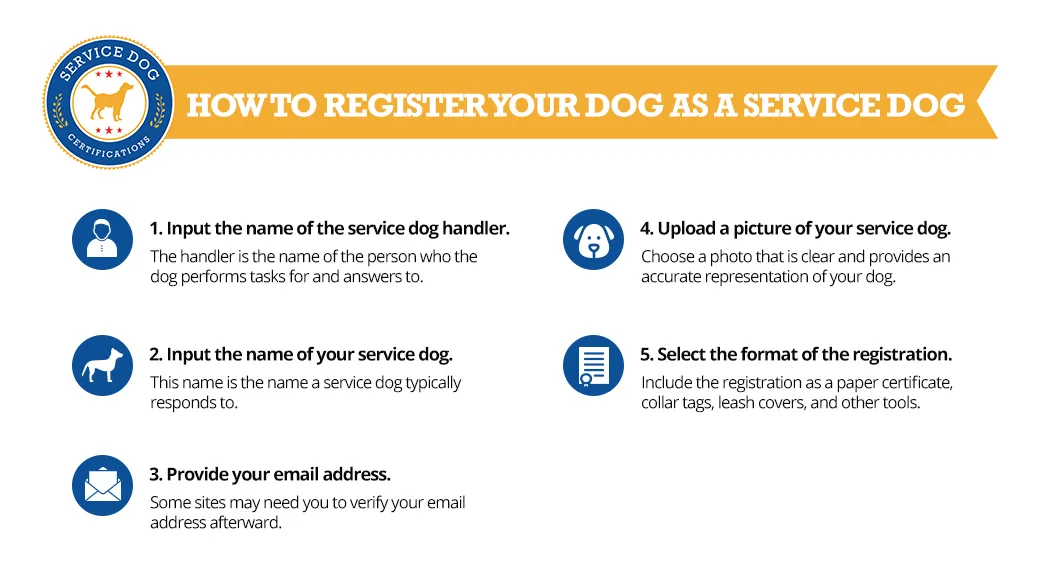Home Page › Blog › What is a Seizure Alert Dog
What is a Seizure Alert Dog

Epilepsy is a group of brain disorders and is the fourth most common neurological disease in the U.S, just behind Alzheimer’s, migraines, and strokes. The unique nerve cell activity in the brain defines epilepsy, causing seizures. Seizures deeply affect a person’s life and often prevents them from living a fulfilling life. Fortunately, a seizure alert dog can predict an upcoming episode and warn its handler to take immediate precautions. How exactly a seizure alert dog jumps into action, we’ll discuss below.
How Seizures Can Harm People
Seizures have a wide range of symptoms: Some people may display mild shaking; others might twitch their extremities uncontrollably. Others stare blankly during an attack. Although the symptoms may be mild, they can cause significant problems if they are in the middle of an activity like driving, swimming, or working with heavy equipment.
During a seizure, people can injure themselves and cause accidents due to loss of control. And although most episodes end on their own without problems, a small percentage of seizure attacks end with injury or lasting brain damage. In extreme cases, it may even lead to life-threatening emergencies or death. According to the Epilepsy Foundation, people diagnosed with epilepsy are 1.6 to 3 times at a higher risk of dying than those without the disorder. About 1 out of 3 people who have epilepsy have to find ways to live with uncontrolled seizures because no medications are known to treat their condition.
How Seizure Alert Dogs Can Help
Because seizures can have significant repercussions, it’s essential to be aware of when one is starting. When there’s an advanced warning, an individual can prepare for its onset and take precautions. This is where seizure alert dogs, a specific type of service dog, can make a vital difference. About fifteen percent of dogs can predict seizures 10 to 20 minutes before they occur. This crucial window of time gives individuals the opportunity to find a safe environment, obtain medical help, or take medications.
How seizure alert dogs detect impending seizures remains unconfirmed. However, research indicates that dogs may be able to predict a seizure by two methods—changes in scent and the identification of specific motor changes in the individual.
A 2019 article published in Scientific Reports found that the accuracy rate for seizure alert dogs is very high, from 67 to 100 percent. As the body changes its processes, it emits distinct odors through the bloodstream, breath, sweat, and urine. Dogs, with their highly sensitive sense of smell, can detect biological changes in humans. It’s also thought that dogs can spot small motor differences in humans before a seizure, like pupillary changes or slight tremors.

A Seizure Alert Dog’s Natural Ability
Unlike guide dogs and mobility support dogs, seizure detection is a task that dogs can’t train to perform. Because scientists still don’t know the exact method seizure alert dogs use to detect seizures, training dogs to do so reliably isn’t possible. Dogs who can predict a seizure do so naturally.
Some trainers attempt to “teach” dogs to detect a seizure using the sweat emitted by a seizure patient. Unfortunately, this method of training is misguided. Dogs must spot the signs that occur before a seizure event, not during or after. Teaching a dog how to detect an oncoming seizure using such a method may result in low success rates.
Seizure Response Dogs Vs Seizure Alert Dog
Seizure response dogs are often mistaken for seizure alert dogs, but they are not the same.
Seizure response dogs assist an individual during and after a seizure, but they don’t predict one. These dogs can assist by placing the person in a position that helps them breathe better. These dogs can also get help, guide the person to a preset safe location, or help them regain their balance.
Because supporting people through and after seizures is crucial, service dogs that can detect seizures are often also trained to be seizure response dogs. When dogs perform both tasks, as seizure alert and a seizure response dog, they are called “seizure dogs.”
Becoming a Seizure Alert Dog
Interestingly, service dogs who received training as seizure response dogs may develop the ability to perform seizure detection. This innate ability may form after six months working as an individual’s seizure response dog. Perhaps repeated exposure to the seizure experience fosters the natural ability to detect seizures in many response dogs.
Seizure alert dogs are an example of how much humans still don’t know about canine abilities. Though dogs have evolved alongside humans for thousands of years as our domesticated best friends, we have yet to uncover all the ways dogs can help humans. From helping serve as psychiatric service dogs to detecting seizures, canines are tremendous assets to humans.
Once you have a fully trained service dog that can detect seizures, registering or certifying your service dog is an optional step. Registrations, certifications and ID cards are helpful accessories service dog owners use for day to day life.
However, no third party can demand these items as a condition to accepting a service dog. They also do not act in lieu of proper verification. To verify someone has a seizure alert dog, third parties are allowed to ask two questions under ADA rules: 1. Is the dog required because of a disability? and 2. What work or task has the dog been trained to perform?
About the Author: The writing team at Service Dog Certifications is made up of folks who really know their stuff when it comes to disability laws and assistance animals. Many of our writers and editors have service dogs themselves and share insights from their own experiences. All of us have a passion for disability rights and animals.
5 comments
Leave a Reply Cancel reply
Latest Posts

Ohio Service Dog Requirements
You can bring a service dog almost anywhere where pets aren’t allowed in Ohio as long as you meet all the necessary requirements. The rights of service dog handlers in the Buckeye State are covered under federal and state laws. This guide will walk you through Ohio’s legal requirements for service dogs. Ohio Health Requirements […]

Read More

How to Bring a Service Dog to Disneyland
Trained service dogs are more than welcome to join their handlers at Disneyland. In this guide, we’ll explain Disneyland’s policies and give practical advice for bringing a service dog to Disneyland for the first time. Disneyland’s Service Dog Policies The Magic Kingdom is happy to welcome trained service dogs across most park locations! They kindly […]

Read More

Can Dogs Eat Tomatoes?
Yes! Dogs can safely enjoy tomatoes, but there are a few risks to be aware of so you can feed your dog responsibly. Fully ripe tomatoes (without the stems and leaves) can actually have nutrients that are good for your pup. Tomatoes have chlorogenic acid, an antioxidant that can have anti-inflammatory effects in cells. They’re […]

Read More










When you answer question #2 – 2. What work or task has the dog been trained to perform? — in lue of saying assist or respond to seizures, can the response be vague, such as “assist me with balance issues”? I have non-epileptic seizures, and most people do not know of this condition. Whenever I mention the word seizure, friends and family become immediately uncomfortable. Looking for an honest answer that doesn’t cause distress for the people around me.
Most third parties will likely accept that answer if you are understandably sensitive about the specific nature of your disability.
It’s not only dogs that can alert, pre seizure, out cat did this without training before a seizure, we had a cat that would break our dissociative episode by biting the upper inside of our forearm, he did this without training, we really reliedon then for pre seizure alerts, and breaking dissociative episodes daily basis, we still don’t understand why they couldn’t be considered service animals, they were a necessity, and performed a task related to our disabilities.
Non-dog animals have certainly demonstrated the ability to provide trained assistance to people, but under ADA rules only dogs are recognized as service animals.
I had a similar situation with my deceased cat Prince Shadow. While I was going through a seizure in front of my deceased fiancé he put Prince Shadow on my lap and he proceeded to purr/meow while licking my face as if he were saying “Mom, snap out of it!”. He was never “taught” to do that. It was completely instinctive.